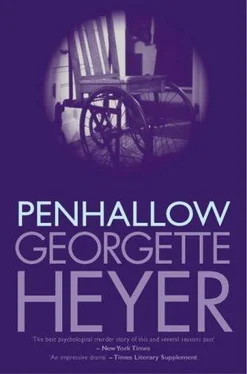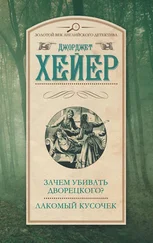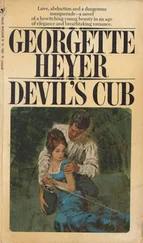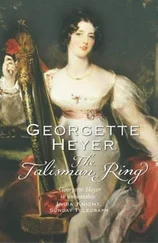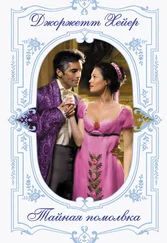Джорджетт Хейер - Penhallow
Здесь есть возможность читать онлайн «Джорджетт Хейер - Penhallow» весь текст электронной книги совершенно бесплатно (целиком полную версию без сокращений). В некоторых случаях можно слушать аудио, скачать через торрент в формате fb2 и присутствует краткое содержание. Год выпуска: 1942, Жанр: Детектив, на английском языке. Описание произведения, (предисловие) а так же отзывы посетителей доступны на портале библиотеки ЛибКат.
- Название:Penhallow
- Автор:
- Жанр:
- Год:1942
- ISBN:нет данных
- Рейтинг книги:3 / 5. Голосов: 1
-
Избранное:Добавить в избранное
- Отзывы:
-
Ваша оценка:
- 60
- 1
- 2
- 3
- 4
- 5
Penhallow: краткое содержание, описание и аннотация
Предлагаем к чтению аннотацию, описание, краткое содержание или предисловие (зависит от того, что написал сам автор книги «Penhallow»). Если вы не нашли необходимую информацию о книге — напишите в комментариях, мы постараемся отыскать её.
Penhallow — читать онлайн бесплатно полную книгу (весь текст) целиком
Ниже представлен текст книги, разбитый по страницам. Система сохранения места последней прочитанной страницы, позволяет с удобством читать онлайн бесплатно книгу «Penhallow», без необходимости каждый раз заново искать на чём Вы остановились. Поставьте закладку, и сможете в любой момент перейти на страницу, на которой закончили чтение.
Интервал:
Закладка:
After the war, Ingram, who had married a Devonshire girl during one of his leaves, settled down on his gratuity, and the small fortune left to him by his mother, at the Dower House. He was a favourite with his father, who could always be induced to disburse money for such extraneous expenses as Myra’s operation for appendicitis, Rudolph’s and Bertram’s schooling, the upkeep of half-a-dozen good hunters, and the building of a garage beside the Dower House. These depredations were a constant thorn in Raymond’s flesh; and an added annoyance was supplied by Ingram’s having inherited the whole of his mother’s private fortune. Since Raymond would inherit the estate, which was entailed, this arrangement seemed fair enough to any impartial critic, but his being wholly left out of Rachel’s will had always galled Raymond unbearably.
Alone amongst his brothers, he, who passionately loved every stone, every blade of grass on the estate, had not been born at Trevellin. Not even Ingram, uncannily swift to find out the joints in his armour, guessed with what irrational bitterness he resented this. His sturdy insularity made it revolting to him that he had been born abroad, but so it was. Penhallow had taken his Rachel on a prolonged honeymoon, attended by Martha, her maid, who came from Rachel’s own home; and joined later by Delia, her sister, who had been with her when Raymond was born. Raymond was three months old before he saw the home of his fathers. But Ingram, Eugene, Charmian, Aubrey, the twins, and even Clay, had all first seen the light in that big, irregularly shaped room at the head of the main staircase, which looked south to the valley of The Fowey.
He had been a peevish baby, a cross-grained little boy, who had grown into a taciturn man, who bade fair to develop, in later years, into an eccentric. He had no interest in anything beyond the bounds of Trevellin; and from never having been a favourite with either parent had early acquired a sturdy independence, and a habit of keeping whatever thoughts he cherished to himself. His younger brothers stood a little in awe of him; his father, recognising in him a will quite as stubborn as his own, accorded him a certain amount of respect mixed with a good deal of exasperation at the pedestrian common sense which was wholly alien to his own fantastic and extravagant character. Since Penhallow insisted on keeping his hand on the reins of government, they were obliged to see more of one another than was good for their tempers. Penhallow stigmatised Raymond as a cheeseparing hunk, with the soul of a shopkeeper; Raymond said bitterly that if some restraint were not put upon Penhallow the whole estate would be wasted before it came into his own more careful hands.
It was, however, quite impossible to put any restraint upon Penhallow. Eccentric he might be, but he was not in the least mad. His near neighbour, and oldest acquaintance, John Probus, said that he had been born into the wrong age, and reminded him of his grandfather, a hard-drinking, hard-riding, nineteenth-century squire, whom he could just remember, and who had gambled away a considerable portion of his estates, and had ended his days a martyr to gout. Penhallow did not gamble away his estates: he mortgaged them.
He had other habits, less disastrous but almost as irritating to his heir, chief amongst which was his predilection for keeping enormous sums of money locked away in a battered tin box, which he stowed in one of the cupboards of his preposterous bed. It was nothing unusual for him to hoard several hundreds of pounds in this freakish way, which he saved, or cast about with a lavish hand, just as his fancy dictated. He would bestow a casual handful of crumpled notes upon any of his children who had happened to please him; scatter coins amongst his servants; send one of his sons, or old Reuben, off with a bulging wallet to purchase some piece of furniture which he had seen advertised in the local paper as being put up for auction in a sale and which he had taken a sudden fancy to possess; bid the Vicar to help himself from the open box, when that gentleman called to beg a donation for the poor of the parish, or for the renovations to the Church; and generally behave as though he were a sort of Midas to whom gold was no sort of object. It amused him to compel Raymond to keep him supplied with money, which he did by threatening to send Jimmy the Bastard to the Bank in Bodmin with his cheque, if his disapproving heir refused to perform the errand.
Raymond had one of these scrawled cheques in his pocket as he left the house after his morning’s interview with his parent. These daily meetings seldom passed without friction, but this one had been stormier than most. Raymond, going straight from the breakfast-table to his father’s room, had found Penhallow in a smouldering rage, shouting abuse at old Martha, who had just finished tidying the room. His eyes had gleamed at sight of his son, and he had lost no time in trying to pick a quarrel with him. Eugene would have diverted his wrath with his nimble tongue; Ingram, or either of the twins, would have gratified him by losing their tempers, and shouting back at him with a complete lack of filial respect, or self-control; Raymond merely stood before the fire, with his feet wide-planted, the first three fingers of either square hand thrust into the slit pockets in the front of his whipcord breeches, and a heavy scowl on his face. Nothing could have annoyed Penhallow more than his invariable refusal to be goaded into fury.
“Dumb, are you?” he roared, heaving himself up in his bed. “You sulky young hound, if you’d the spirit of a louse you’d find your tongue quick enough!”
“When you’ve quite finished,” Raymond had said coldly, “you can take a look at that lot!”
He jerked his head towards the ledgers he had placed on the table beside the bed, but he did not move from his position before the fire. Penhallow sneered at him. “I ought to have made you into a damned accountant! I don’t doubt you’d have been happy to have spent your life totting up columns of figures!”
As this taunt had no visible effect upon Raymond, he passed to a wholesale criticism of his management of the estate, and ended by remarking that he had heard from Ingram that the Demon colt was likely to prove a failure. Ingram had said nothing of the sort, but the shaft served to bring a flush to Raymond’s cheeks. He replied briefly: “I’ve got a hit.”
Penhallow at once forgot that he wanted to enrage his son. His brows drew together. “A hit, eh? Well! Early days yet. Got his sire’s shoulders?”
“Grand shoulder-blade and forearm. Powerful quarters; hocks well-bent; stifles high and wide,” Raymond responded.
“Back?” Penhallow shot at him. “Out with it! I remember thinking, when I saw his dam—”
“Short above and long below,” interrupted Raymond, the corners of his mouth lifting.
Penhallow grunted. “I’ll take a look at him. Got him out yet?"
“I’ve had him out a couple of weeks now.”
“Where?” Penhallow demanded.
“The Upper Paddock.”
“Good! How many have you put with him?”
“Three others.”
Penhallow nodded. “Quite right. Never have more than four yearlings to a paddock.” He looked Raymond over. “Bred him for selling, I suppose?”
“Yes.”
“God, I don’t know where you get your huckstering instinct from!”
Raymond shrugged, and was silent. Penhallow’s ill humour descended upon him again. He bethought him of a piece of news likely to find no sort of favour with his grim-faced heir. He informed him casually of his plans for Clay.
That did rouse Raymond, if not to an exhibition of Penhallow rage, at least to a considerable degree of annoyance. It seemed to him poor economy to remove Clay from college before the expiration of his three years there; it exasperated him to be obliged to stand by while his father laid down a substantial sum of money to buy Clay into a firm which he would infallibly leave the instant Penhallow was underground; and in addition to these considerations he wanted no more brothers quartered at Trevellin. When Penhallow added to these unwelcome tidings an announcement that he thought it nigh time young Aubrey stopped messing about in town, and came home, he shut his lips tightly, turned on his heel, and strode out of the room.
Читать дальшеИнтервал:
Закладка:
Похожие книги на «Penhallow»
Представляем Вашему вниманию похожие книги на «Penhallow» списком для выбора. Мы отобрали схожую по названию и смыслу литературу в надежде предоставить читателям больше вариантов отыскать новые, интересные, ещё непрочитанные произведения.
Обсуждение, отзывы о книге «Penhallow» и просто собственные мнения читателей. Оставьте ваши комментарии, напишите, что Вы думаете о произведении, его смысле или главных героях. Укажите что конкретно понравилось, а что нет, и почему Вы так считаете.
